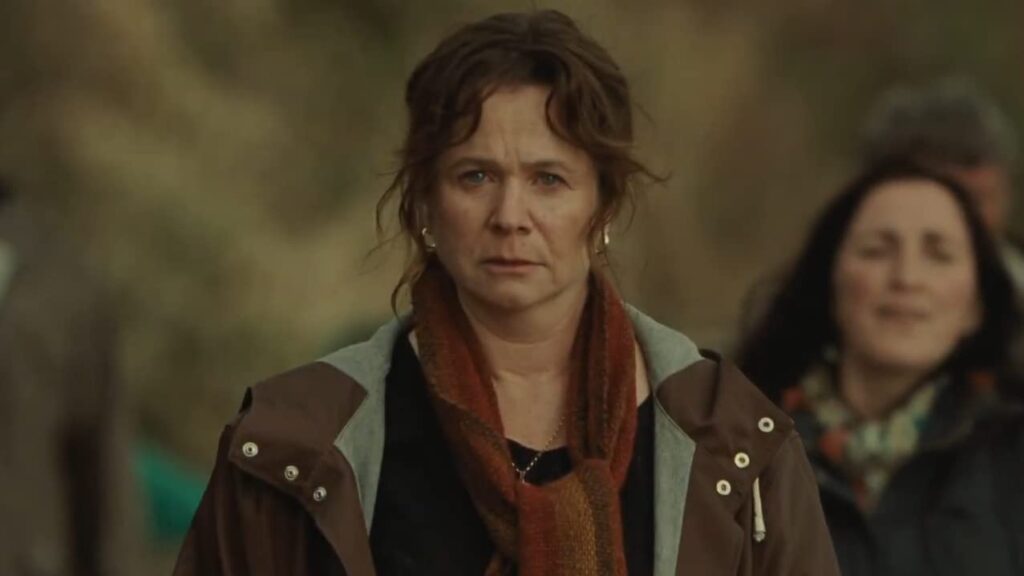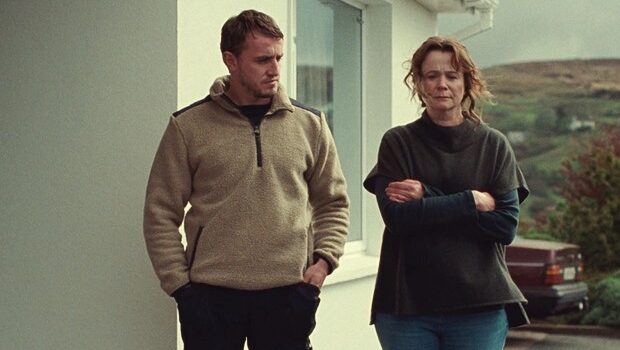By Alex McPherson
Brooding, raw, yet ultimately uneven, directors Saela Davis and Anna Rose Holmer’s “God’s Creatures” is dripping with dread-inducing atmosphere and acting talent, led by an excellent Emily Watson.
Set in a coastal Irish fishing town — drenched in fog, dreariness, antiquated ideals, and a heavy sprinkling of impending doom — the film opens with the drowning of a young man. In this community, nobody is taught how to swim, so the villagers aren’t tempted to risk death themselves to rescue someone, a fitting illustration of the stiff norms that have remained for generations.
Aileen (Watson) works as a supervisor at the seafood processing plant (run entirely by women, except for one male manager), preparing oysters and fish caught by men in the village. She lives with her stern husband Con (Declan Conlon) and near-catatonic father-in-law Paddy (Lalor Roddy), who will barely move a muscle only to suddenly slap Aileen in the face, implying a violent past.
Aileen dutifully goes through the motions — working long hours, quietly conversing with coworkers during smoke breaks, babysitting her daughter Erin’s (Toni O’Rourke) infant child, grabbing an evening drink at the pub — until the day her dearly beloved son, Brian (Paul Mescal), returns from a multi-year trip to Australia. Brian had left Aileen and company unexpectedly, not communicating with the family while overseas.
This left a gaping wound in Aileen’s heart, so his unexpected reappearance fills her with joy; Con and Erin are more ambivalent about Brian’s return. Brian is eager to resume working on his grandfather’s oyster farm, and Aileen has no qualms about stealing supplies from work to support him. In fact, Aileen is willing to sacrifice much to protect her child, even if he turns out to be a far different person than she imagines he is.
Soon enough, troubles arise. Brian is accused of sexual assault by a young woman and family friend named Sarah Murphy (Aisling Franciosi), who works at Aileen’s plant and once had a romantic relationship with Brian years ago. Aileen provides an alibi in court for Brian without a second thought, thus saving him from further investigation.
This decision, however, gradually eats away at Aileen’s psyche, as she sees Sarah’s subsequent ostracization from the townsfolk, and experiences a crisis of conscience. She’s torn between her maternal instincts and factual reality, slowly but surely recognizing the troubled traditions that control her community, manifesting in both subtle and blunt ways. The title “God’s Creatures” takes an ironic bent as Aileen comes to recognize the harmful dynamics at play, baked into the fabric of the land.
Suffice to say, “God’s Creatures” is quite a downer. A simmering menace persists from beginning to end — largely thanks to impeccable sound design and carefully calibrated performances — rendering this bleak drama practically a horror film. With a muted color palette and stark, wide vistas, Chayse Irvin’s cinematography is fittingly chilly. The score, by Danny Bensi and Saunder Jurriaans, is full of discordant strings and startling percussion, complementing the clamor of oyster shells and the swoosh of lapping waves.
Like a living, breathing monstrosity, the music builds upon itself as Aileen’s conflict intensifies, incorporating additional elements that, at one point, evoke the feeling of an unseen creature breathing heavily — an omnipresent threat that exerts control over anyone in its grip. Shane Crowley’s screenplay, while occasionally leaning into heavy-handedness, rarely feels out-of-place, its authenticity helped by thick Irish accents.
Watson is, as ever, absolutely mesmerizing as Aileen, communicating multitudes without uttering a word. Although the film withholds detail of her past and her close bond with Brian, Aileen remains a believably conflicted protagonist. Her initial relief and happiness with her son’s return turns to rash protectiveness, doubt, anger, and instability. Watson sells each aspect of her character’s evolution (or de-evolution), the camera focusing on her during prolonged closeups where we witness the guilt, grief, and fire burning just beneath her stoic facade.
Mescal’s charismatic screen presence suits the character of Brian, a shifty lad whose banality belies a violent, impulsive heart. Brian acts very differently when he’s being watched from when he’s alone, and Mescal expertly embodies that dichotomy, although the film leaves little doubt to Brian’s culpability. Franciosi almost steals the show, lending haunted gravitas to the role of Sarah, a woman alienated from the only place she’s called home.
Despite excellent fundamentals and ever-timely subject matter, though, Davis and Holmer’s film fails to explore its characters and the world they inhabit with the depth they merit. “God’s Creatures” prizes tone above all else, grounding us in a richly textured setting, yet neglecting to give its inhabitants the same care.
Indeed, Aileen’s grappling with morality does raise pertinent questions about love and loyalty versus truth and justice, but winds up wading through melodramatic waters. It’s a shame that, at arguably the height of her intensity, the film turns away from her, and undercuts both Watson’s performance and the contemplative storytelling that came before.
In addition, the film’s focus on Aileen’s struggles takes attention away from Sarah’s experiences and the isolation she feels. Aileen is often relegated to observing her from afar, eventually recognizing the role she plays in Sarah’s suffering. This approach, while giving Watson loads of time to showcase her skill as a performer, lessens the emotional heft of Sarah’s story.
Scenes where Aileen encounters Sarah tap into the insidious ways that casual misogyny and power imbalances manifest themselves, but only on the surface level. One searing monologue by Franciosi at the film’s conclusion alludes to a resilient, scarred, and complex character who deserves more than a few moments to get the spotlight. Davis and Holmer choose to merely acknowledge Sarah’s challenges rather than engage in insightful commentary, especially surrounding her treatment by others, and her own courage and strength despite it. By the time “God’s Creatures” finally centers her narrative, it proves to be too little, too late — deserving of a plot with wider focus, and one less centered on Aileen’s predictable (albeit undeniably well-acted) psychological turmoil.
Still, the formal elements of “God’s Creatures” shine, even when the drama takes jarring turns. This is an icy, chilly ordeal, which leaves a mark once the end credits roll regardless.

“God’s Creatures” is a 2022 psychological drama co-directed by Saela Davis and Anna Rose Holmer, starring Emily Watson, Paul Mescal and Aisling Franciosi. It is rated R for language, and runs 1 hour, 40 minutes. It opened in select theatres in U.S. on Sept. 30 and is now available to rent through digital platforms. Alex’s Grade: B.
Alex McPherson is an unabashed pop culture nerd and a member of the St. Louis Film Critics Association.

